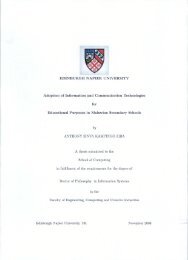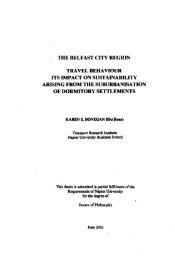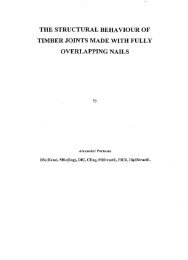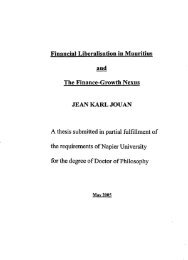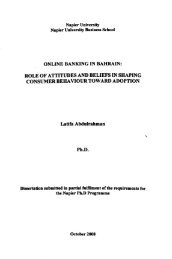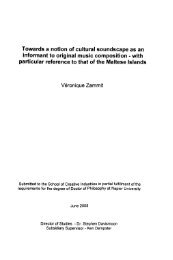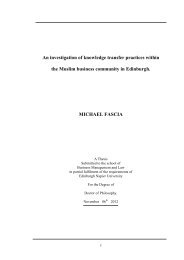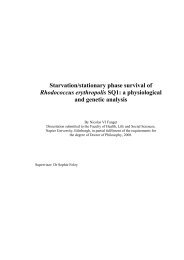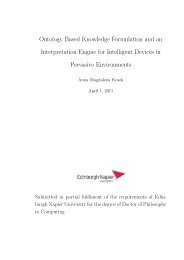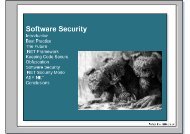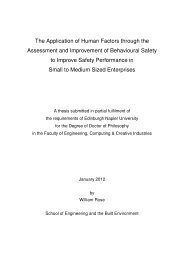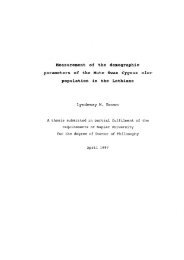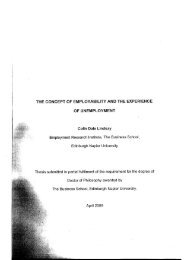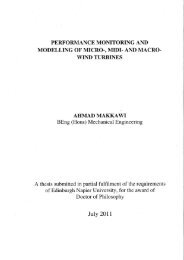The Role of Niche Tourism Products in Destination - Repository ...
The Role of Niche Tourism Products in Destination - Repository ...
The Role of Niche Tourism Products in Destination - Repository ...
Create successful ePaper yourself
Turn your PDF publications into a flip-book with our unique Google optimized e-Paper software.
<strong>in</strong>sights <strong>in</strong>to w<strong>in</strong>e tourist motivations and preferences. <strong>The</strong> research presented here also only focuses on two areas <strong>of</strong> w<strong>in</strong>e tourism<br />
provision – education and festivals – more research is needed to exam<strong>in</strong>e other parts <strong>of</strong> the w<strong>in</strong>e tourism experience.<br />
F<strong>in</strong>ally, <strong>in</strong> the niche area <strong>of</strong> festival and event tourism, research is aga<strong>in</strong> limited by sample size and geographical scope, especially<br />
<strong>in</strong> the case <strong>of</strong> the work with Festival leaders <strong>in</strong> Ed<strong>in</strong>burgh. Although the stakeholder research employs a cross cultural approach,<br />
more <strong>in</strong>sight is needed <strong>in</strong>to the environmental, social and cultural dimensions <strong>of</strong> event impacts on dest<strong>in</strong>ations. Much <strong>of</strong> the<br />
research presented here has a supply side perspective and there is limited <strong>in</strong>sight <strong>in</strong>to festival and event tourist motivations and<br />
experiences and demand side <strong>in</strong>fluences at the dest<strong>in</strong>ation.<br />
5.4 Further Research Opportunities<br />
Complet<strong>in</strong>g the PhD by publication route has been an <strong>in</strong>credible personal learn<strong>in</strong>g journey. <strong>The</strong> act <strong>of</strong> revisit<strong>in</strong>g and reflect<strong>in</strong>g on<br />
past work <strong>in</strong> this way, has enabled me to recognise its strengths and limitations, and helped <strong>in</strong> sett<strong>in</strong>g the future directions <strong>of</strong> my<br />
work. It has enabled the identification <strong>of</strong> a number <strong>of</strong> key opportunities to extend this work through further research.<br />
One <strong>of</strong> the key benefits <strong>of</strong> complet<strong>in</strong>g this process has been an awareness <strong>of</strong> my development as a researcher. In epistemological<br />
and ontological terms I have progressed from a concentration on us<strong>in</strong>g a quantitative approach, perceiv<strong>in</strong>g the tourist world to be<br />
real and predictable, to embrac<strong>in</strong>g us<strong>in</strong>g more mixed methodologies with a focus towards a more qualitative/<strong>in</strong>terpretative approach<br />
to research. This can be seen <strong>in</strong> the context <strong>of</strong> Davies (2003) who stresses the complementarity <strong>of</strong> quantitative and qualitative data<br />
as an important facet <strong>of</strong> tourism research. Because <strong>of</strong> the diverse nature <strong>of</strong> the research presented here, I have tended to adopt a



